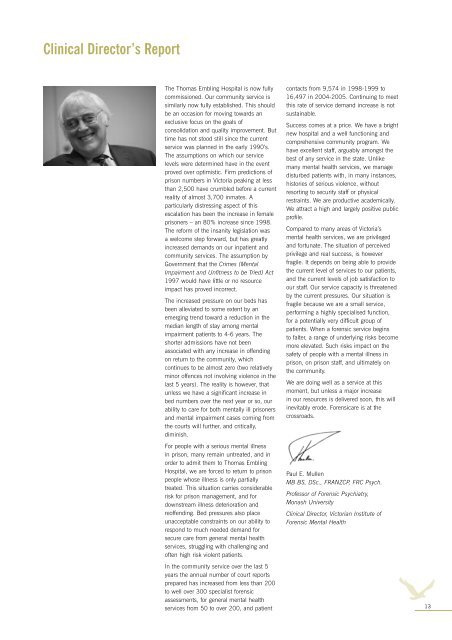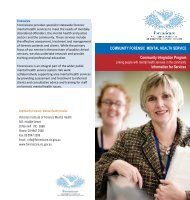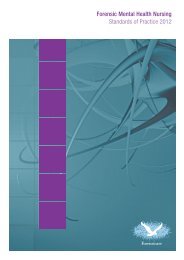Annual Report 2004-2005 - Forensicare
Annual Report 2004-2005 - Forensicare
Annual Report 2004-2005 - Forensicare
You also want an ePaper? Increase the reach of your titles
YUMPU automatically turns print PDFs into web optimized ePapers that Google loves.
Clinical Director’s <strong>Report</strong><br />
The Thomas Embling Hospital is now fully<br />
commissioned. Our community service is<br />
similarly now fully established. This should<br />
be an occasion for moving towards an<br />
exclusive focus on the goals of<br />
consolidation and quality improvement. But<br />
time has not stood still since the current<br />
service was planned in the early 1990’s.<br />
The assumptions on which our service<br />
levels were determined have in the event<br />
proved over optimistic. Firm predictions of<br />
prison numbers in Victoria peaking at less<br />
than 2,500 have crumbled before a current<br />
reality of almost 3,700 inmates. A<br />
particularly distressing aspect of this<br />
escalation has been the increase in female<br />
prisoners – an 80% increase since 1998.<br />
The reform of the insanity legislation was<br />
a welcome step forward, but has greatly<br />
increased demands on our inpatient and<br />
community services. The assumption by<br />
Government that the Crimes (Mental<br />
Impairment and Unfitness to be Tried) Act<br />
1997 would have little or no resource<br />
impact has proved incorrect.<br />
The increased pressure on our beds has<br />
been alleviated to some extent by an<br />
emerging trend toward a reduction in the<br />
median length of stay among mental<br />
impairment patients to 4-6 years. The<br />
shorter admissions have not been<br />
associated with any increase in offending<br />
on return to the community, which<br />
continues to be almost zero (two relatively<br />
minor offences not involving violence in the<br />
last 5 years). The reality is however, that<br />
unless we have a significant increase in<br />
bed numbers over the next year or so, our<br />
ability to care for both mentally ill prisoners<br />
and mental impairment cases coming from<br />
the courts will further, and critically,<br />
diminish.<br />
For people with a serious mental illness<br />
in prison, many remain untreated, and in<br />
order to admit them to Thomas Embling<br />
Hospital, we are forced to return to prison<br />
people whose illness is only partially<br />
treated. This situation carries considerable<br />
risk for prison management, and for<br />
downstream illness deterioration and<br />
reoffending. Bed pressures also place<br />
unacceptable constraints on our ability to<br />
respond to much needed demand for<br />
secure care from general mental health<br />
services, struggling with challenging and<br />
often high risk violent patients.<br />
In the community service over the last 5<br />
years the annual number of court reports<br />
prepared has increased from less than 200<br />
to well over 300 specialist forensic<br />
assessments, for general mental health<br />
services from 50 to over 200, and patient<br />
contacts from 9,574 in 1998-1999 to<br />
16,497 in <strong>2004</strong>-<strong>2005</strong>. Continuing to meet<br />
this rate of service demand increase is not<br />
sustainable.<br />
Success comes at a price. We have a bright<br />
new hospital and a well functioning and<br />
comprehensive community program. We<br />
have excellent staff, arguably amongst the<br />
best of any service in the state. Unlike<br />
many mental health services, we manage<br />
disturbed patients with, in many instances,<br />
histories of serious violence, without<br />
resorting to security staff or physical<br />
restraints. We are productive academically.<br />
We attract a high and largely positive public<br />
profile.<br />
Compared to many areas of Victoria’s<br />
mental health services, we are privileged<br />
and fortunate. The situation of perceived<br />
privilege and real success, is however<br />
fragile. It depends on being able to provide<br />
the current level of services to our patients,<br />
and the current levels of job satisfaction to<br />
our staff. Our service capacity is threatened<br />
by the current pressures. Our situation is<br />
fragile because we are a small service,<br />
performing a highly specialised function,<br />
for a potentially very difficult group of<br />
patients. When a forensic service begins<br />
to falter, a range of underlying risks become<br />
more elevated. Such risks impact on the<br />
safety of people with a mental illness in<br />
prison, on prison staff, and ultimately on<br />
the community.<br />
We are doing well as a service at this<br />
moment, but unless a major increase<br />
in our resources is delivered soon, this will<br />
inevitably erode. <strong>Forensicare</strong> is at the<br />
crossroads.<br />
Paul E. Mullen<br />
MB BS, DSc., FRANZCP, FRC Psych.<br />
Professor of Forensic Psychiatry,<br />
Monash University<br />
Clinical Director, Victorian Institute of<br />
Forensic Mental Health<br />
13














